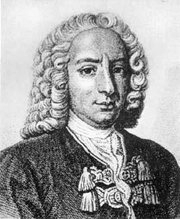Bernoulli, Daniel (Energy)
Bernoulli, Daniel
Daniel Bernoulli (1700-1782), a Dutch-born mathematician, spent much of his life in Basel, Switzerland. He is known for his seminal theoretical contributions to the field of aerodynamics. Bernoulli's Principle is a statement of the conservation of energy for a steady, non-viscous, incompressible flow without friction or other irreversible effects. It states that in fluid flow, an increase in velocity happens simultaneously with decrease in pressure, i.e., velocity is greatest and pressure lowest at a point of constriction. This equation is used as a basic design principle in hydraulic systems, such as liquid piping networks, and is shown below.
In this equation: the subscripts 1 and 2 refer to conditions of the fluid at points 1 and 2 within the system; P is fluid pressure; v is the fluid specific volume; V is the fluid velocity; g is the gravitational constant; and z is the elevation above a reference point.
His chief work is Hydrodynamique (Hydrodynamica), published in 1738, which is organized around the principle of the conservation of energy.

